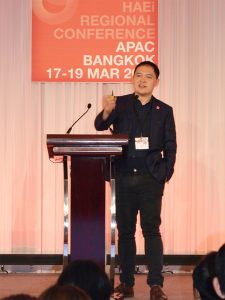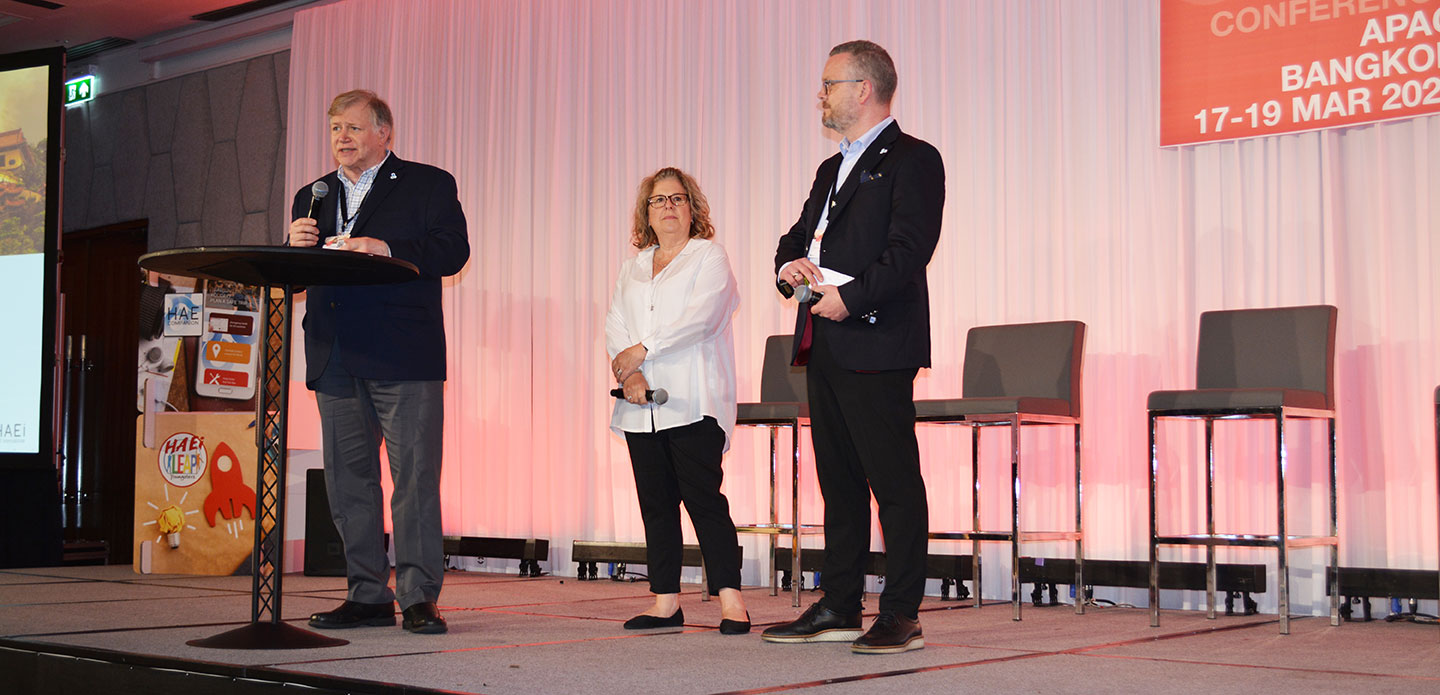This article is taken from an extensive feature on the 2023 HAEi Regional Conference APAC, published in Global Perspectives #1 2023
HAEi’s global advocacy philosophy – think globally, act regionally – was transformed into reality on 17-18 March at the 2023 HAEi Regional Conference APAC held in Bangkok, Thailand. Over 250 participants from 22 countries attended, including people with HAE, caregivers, physicians/scientists, and pharmaceutical company representatives.
Enthusiasm and motivation for “Taking Action” could be felt throughout the conference as participants learned, interacted, and made plans to ramp up advocacy efforts in their home countries. Below are highlights from the various sessions held during this highly successful meeting – the first of three HAEi Regional Conferences to be held over just 12 months.
Conference Welcome
The HAEi Leadership Team – President and Chief Executive Officer Anthony J. Castaldo, Executive Vice President and Chief Operating Officer Henrik Balle Boysen, and Chief Regional Patient Advocate Fiona Wardman – opened the conference with a warm welcome. The team invited delegates to spend the next two days meeting others in the region to share experiences, take advantage of the unique learning opportunities, and have fun!
Henrik went on to note that the conference’s theme was “Take Action”. He explained that the sessions were structured to inspire new and creative approaches to HAE advocacy and engagement that can be applied in everyone’s home country. Tony recommended that all HAEi friends seek out fellow advocates, medical professionals, and industry attendees they don’t already know.
Fiona noted that almost all the region’s Member Organizations were in attendance. She encouraged representatives from Nepal and Vietnam to continue their efforts to form an HAE group and congratulated the efforts underway to identify patients and physicians in Cambodia, Laos, Papua New Guinea, and Sri Lanka.
The three leaders then took turns expressing their individual hopes that all attendees would be inspired by what they learn and take action to translate that knowledge and enthusiasm into efforts that improve the lives of HAE patients in their local communities.
HAEi Regional Conference APAC Keynote Address
 Dr. Philip Li from Hong Kong University delivered a highly informative talk to open the conference and addressed three main topics: The HAE Experience in Hong Kong, A Call to Arms, and The 4A’s to Tackling HAE in Asia Pacific.
Dr. Philip Li from Hong Kong University delivered a highly informative talk to open the conference and addressed three main topics: The HAE Experience in Hong Kong, A Call to Arms, and The 4A’s to Tackling HAE in Asia Pacific.
The HAE Experience in Hong Kong
Dr. Li began his presentation by describing the Hong Kong success story that required sustained efforts to overcome limited knowledge of HAE and the absence of support from the government and hospitals. The goal of winning access to HAE medicines resulted from the combined efforts of Dr. Li and colleagues, a group of patients who worked to form a Hong Kong HAE group, and support from HAEi. The breakthrough happened in 2019 when Queen Mary Hospital established an HAE treatment Consensus that:
- Affirmed that every patient should have access to C1 esterase inhibitor therapy,
- Established a treatment algorithm and patient management guidelines,
- Promoted physician and patient awareness/education, and
- Insisted on comprehensive family screening.
Dr. Li shared the bottom line result of patient-physician collaboration and HAEi support – people with HAE in Hong Kong can now access medicines. C1-INH is now subsidized, and icatibant is available with “means-tested” financial support. Implementation of family screening has almost quadrupled the number of identified patients in Hong Kong from .16 to .6 per 100,000 of the population. Dr. Li emphasized the need for ongoing family screening because the current HAE population is approximately three times lower than the estimates cited in the literature.
A Call to Arms
Turning to the situation in Asia Pacific, Dr. Li called for continued and even enhanced international collaboration in the region to address issues such as:
- Epidemiology/prevalence of HAE among Asians,
- Unique clinical features among HAE in the Asia Pacific,
- Diagnostic delay and low physician awareness,
- Frequency of laryngeal/abdominal attacks,
- Rates of intubation/ICU admission and hospitalization,
- Genetic or genuine clinical differences vs. referral/ascertainment bias,
- Priorities for HAE diagnosis and management,
- Enhanced public and physician awareness, and
- Referral and diagnostic pathways.
A study Dr. Li co-authored entitled, Epidemiology, Management, and Treatment Access of Hereditary Angioedema in the Asia Pacific Region: Outcomes from an International Survey, reveals an important step in international cooperation among physicians. Published in the April edition of the prestigious Journal of Allergy and Clinical Immunology In Practice, the authors concluded that,
“Hereditary angioedema in the AP differs from that in Western countries. Hereditary angioedema-specific medications were registered in only a minority of countries and territories, but those with patient support groups or regional guidelines were more likely to have better access. Asia Pacific-specific consensus and guidelines are lacking and urgently needed.”
Dr. Li emphasized that raising diagnosis rates will require a cooperative effort to make sure all countries in the region have the appropriate equipment and knowledge for testing. He stressed that most patients in the region do not have access to modern HAE medicines. On-demand treatment is only available in half of the region’s countries – Australia, China, Hong Kong, Japan, South Korea, Taiwan, and Thailand. Moreover, prophylactic treatment is available only in Australia, China, Japan, and Taiwan.
The 4A’s to Tackling HAE in Asia Pacific
In summarizing his message, Dr. Li pointed to four A’s that will lead to further success for HAE in the Asia Pacific:
- Awareness through public and physician education,
- Access to HAE-specific medications,
- Advocacy by patient organizations,
- Alliances with HAEi and the APAACI–the Asia Pacific Association for Allergy, Asthma, and Clinical Immunology.
Dr. Li closed his presentation by challenging participants to be energized by the motivation and momentum generated at the 2023 HAEi Regional Conference APAC. He then called for all parties to work with HAEi in a concerted effort aimed at (1) organizing physicians and patient advocates and (2) marshaling the expertise and resources to win access to HAE medicines throughout the region.
He ended his presentation by reminding the audience that in APAC, “We have the biggest voice in the world, as we represent half of it.”
“A really nice conference – informative and with good networking. Also, nice to share stories about the HAE experience. Hopefully to inspire others and increase awareness.”
“I met so many patients and physicians from all through APAC. The conference was a good chance to learn more about what’s happening in other countries and their HAE journey. Let’s all participate in achieving a better quality of life for HAE patients! Thank you HAEi, for making this conference possible!”
“Nice to meet you, family. Thank you to the sponsors in this event, and thank you for letting me know that we are not alone.”
“Thank you for letting me know we are not alone.”
Find more feature articles from the 2023 HAEi Regional Conference APAC:











